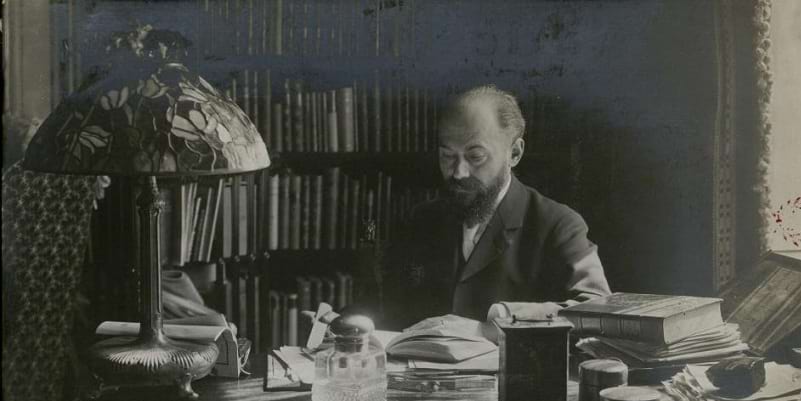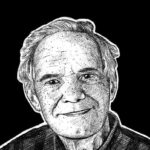Pierre Janet biography and books

Pierre Janet (Pierre Marie Félix Janet, May 30, 1859 – February 24, 1947) was a well-known French psychiatrist, physician, philosopher and psychotherapist. Pierre Janet specialized in the field of dissociation and traumatic memory.
He is best known for his ability to build bridges between academic psychology and the clinical treatments of individuals. He also contributed to the understanding of concepts such as depression, hypnosis, disorders such as anxiety and other abnormal behaviors. Together with well-known psychotherapists such as Wilhelm Wundt and William James, he is mentioned as one of the founders of contemporary psychiatry.
Pierre Janet biography
Pierre Janet was born in Paris, France. His father’s name was Jules Janet, a Parisian lawyer. Mother Fanny Hummel was a devout Catholic housewife. In his autobiography, Janet tells how his childhood was mainly characterized by interests in natural sciences and mystical matters. He hoped to resolve these contradictions by studying philosophy.
Academic background
His choice was strongly influenced by his uncle Paul Janet, also a well-known philosopher of the time and working for a spiritualistic academic institution. At that time, Eclectic Spiritualism was the predominant form of philosophy in France.
This form of philosophy originated in Maine de Biran, under the leadership of Victor Cousin. Thanks to this man, most philosophy students in France learned a typical form of philosophy with a spiritualistic slant.
Pierre Janet later described himself as a spiritual philosopher who distinguished between two irreducible realities, the material and the spiritual reality. He also declared himself liberal and open to science.
Janet studied at the Psychological Laboratory at the Pitié-Salpetriere Hospital in Paris. In 1889 he first published his results of a survey. He also did this in his medical dissertation, in 1892. In 1893 he obtained his degree in medicine.
In 1898, Pierre Janet was appointed as a lecturer in psychology at the Sorbonne. In 1902 Janet became professor of experimental psychology at the Collége de France until 1936. From 1913 he was a member of the board of the Institut de France. He proved to be a central and important figure in French psychology.
Sigmund Freud
There has been much disagreement about whose ideas came first, those of Sigmund Freud or Pierre Janet. This happened, for example, at the 1913 congress in London. For that event, Sigmund Freud wrote about “the theory of hysterical phenomena”, which is said to have been first put forth by Pierre Janet, and later elaborated by Sigmund Freud himself, along with Breuer.
Sigmund Freud stated that they followed his lead when they took the splitting of the mind and dissociation of the personality as the center of their position.
Sigmund Freud also wrote in 1911 about the withdrawal of the neurotic from reality. He stated about this: this fact too could not escape the observation of Pierre Janet. He also used Janet’s terms, such as the expression psychological poverty.
In a 1913 report by Janet, he states that many of the new terms in psychoanalysis stem from old concepts that had been renamed, such as his understanding of psychological analysis and Sigmund Freud’s psychoanalysis. This led to many angry reactions from the followers of Sigmund Freud. This cooled the relationship between Sigmund Freud and Janet.
Sigmund Freud argued that for a long time he was willing to give Janet a lot of credit for his view of neurotic symptoms. However, after some time he said: I think Janet has wasted a lot of credit unnecessarily.
In particular, Janet’s accusation that Freud was guilty of plagiarism stabbed Freud. In an autobiographical sketch he vehemently denied this. In 1937 when the two got the opportunity, Sigmund Freud refused to meet Janet due to the fact that libel and slander had been committed.
Famous quotes
- “A little selfishness is necessary for life, since it is the starting point of consciousness.”
- “Conversation is a word game, but it is a game that sometimes has cruel undertones.”
- “Depressed people want to be taken care of, want to interest others; if they don’t feel interesting, important, they consider that they have ceased to exist, to be visible. And what they think of them, they immediately turn into reality: they are invisible.”
- “Emptiness removes the feeling of suffering, but retains the act of pain.”
- “It is very dangerous to pursue too long an effort in the same direction.”
- “It’s very beautiful intuition, it’s very convenient to explain a phenomenon we don’t know what it is.”
- “Martial (the main character of LOCUS SOLUS) has a very interesting conception of literary beauty: the work must contain nothing real, no observations about the world or the mind, nothing but completely imaginary constructions. These are in themselves ideas from an extrahuman world.”
- “Neuroses are not practical people, they take refuge in the world of dreams, and easily recognize each other, neuroses thus attract each other.”
- “Our mind is made up of a number of mechanisms that all want to work more or less. I say more or less. The trends are more or less good. Some function in deficit, these are bad tendencies that lead to a decrease in strength and vitality.”
- “Psychological operations are not done anyhow. They are subject to many influences. That of society plays a key role here.”
- “Social feelings are infinitely varied and changeable. Moreover, they change quickly or slowly according to whether the individual is unstable or stable. The weak have no lasting loves or hatreds, for strength is necessary for the stability of emotions.”
- “Social life is, more than any other, capable of exhausting people.”
- “Speech is only the expression of orders and obedience.”
- “Talking is already boring, but finally we can manage to make ourselves understood.”
- “The affection for the self, the interest in oneself, disappears with the appearance of the feeling of emptiness.”
- “The arrest of anxiety is the immediate and obligatory use of forces in a boring form; the arrest of jouissance is the free use of forces in an easy and advantageous circumstance.”
- “The battle is not always necessary, but one exposes oneself to it. To decrease the chances of battle, you have to make others believe that you are very strong.”
- “The battle is not always necessary, but one exposes oneself to it. To decrease the chances of battle, you have to make others believe that you are very strong. But to inspire the feeling of strength, one must already have won many battles.
- “The essential social actions are order and command. The timid do not know how to command, and cannot command.”
- “The feeling itself is not eternal, because nothing is eternal: everything evolves and everything changes.”
- “The feeling of emptiness, which corresponds to the complete absence of any feeling. It’s a surprising feeling, common among the exhausted and the neurasthenics. We could define it as the feeling of the loss of feelings, the feeling that there is no feeling.”
- “The feelings of effort, corresponding to acceleration, the feeling of fatigue corresponding to braking, the feeling of suffering or anguish which corresponds to recoil, finally the feeling of enjoyment which corresponds to stopping with discharge.”
- “The finality is only a belated behavior of men, a way of linking language to the movements of our limbs.”
- “The individuals around us are classified according to the verbal fatigue they impose on us.”
- “There are many individuals who, deep down, have nothing to do, who are neither rich nor poor, neither generals, nor soldiers, neither good nor bad, and who are very happy if they are made to play a role.”
- “There is no madness which, in man, cannot be transformed into reality.”
- “There is nothing in the world so tiring, so exhausting as social actions.”
- “Traumas produce their disintegrating effects in proportion to their intensity, duration and repetition.”
- “When we make a great effort to avoid something, we inevitably tend towards the opposite of what we want to avoid.”
- “You always have to be strong in life, even to be happy.”
Publications and books by Pierre Janet et al.
- 1930. Autobiography of Pierre Janet. History of Psychology in Autobiography. Worcester, MA: Clark University Press. Vol. 1, pp. 123–133.
- 1928. L’evolution de la memoire et de la notion du temps. Paris: A Chahine.
- 1910. Une félida artificielle. Revue philosophique 69: 329–357; 483–529.
- 1909. Les nervoses. Paris: Flammarion.
- 1909. Du rôle de l’émotion dans la genèse des accidents névropathiques et psychopathiques. Revue Neurologique 17(2): 1551–1687.
- 1907. The major symptoms of hysteria, 2nd ed. ISBN 0028471709
- 1904. L’amnesie et la dissociation des souvenirs par l’emotion. Journale de Psychologie 1: 417–473.
- 1903. Les obsessions et la psychasthénie (2 vols.). New York: Ayer. ISBN 0405074344.
- 1898. Nevroses et idees fixes. Masson. ISBN 2225822840.
- 1897. L’influence somnambulique et le besoin de direction. Revue Philosophique 43(1): 113–143.
- 1894. Histoire d’une idée fixe. Revue Philosophique 37(1): 121–163.
- 1893. L’amnesie continue. Revue Generale des Sciences 4: 167–179.
- 1891. Etude sur un cas d’aboulie et d’idees fixes. Revue Philosophique 331(1): 258–287.
- 1886. Les actes inconscients et le dedoublement de la personnalite pendant le somnambulisme provoque. Revue Philosophique 22(2): 577–792.
How to cite this article:
Janse, B. (2022). Pierre Janet. Retrieved [insert date] from Toolshero: https://www.toolshero.com/toolsheroes/pierre-janet/
Original publication date: 11/15//2022 | Last update: 05/24/2023
Add a link to this page on your website:
<a href=”https://www.toolshero.com/toolsheroes/pierre-janet/”>Toolshero: Pierre Janet</a>











